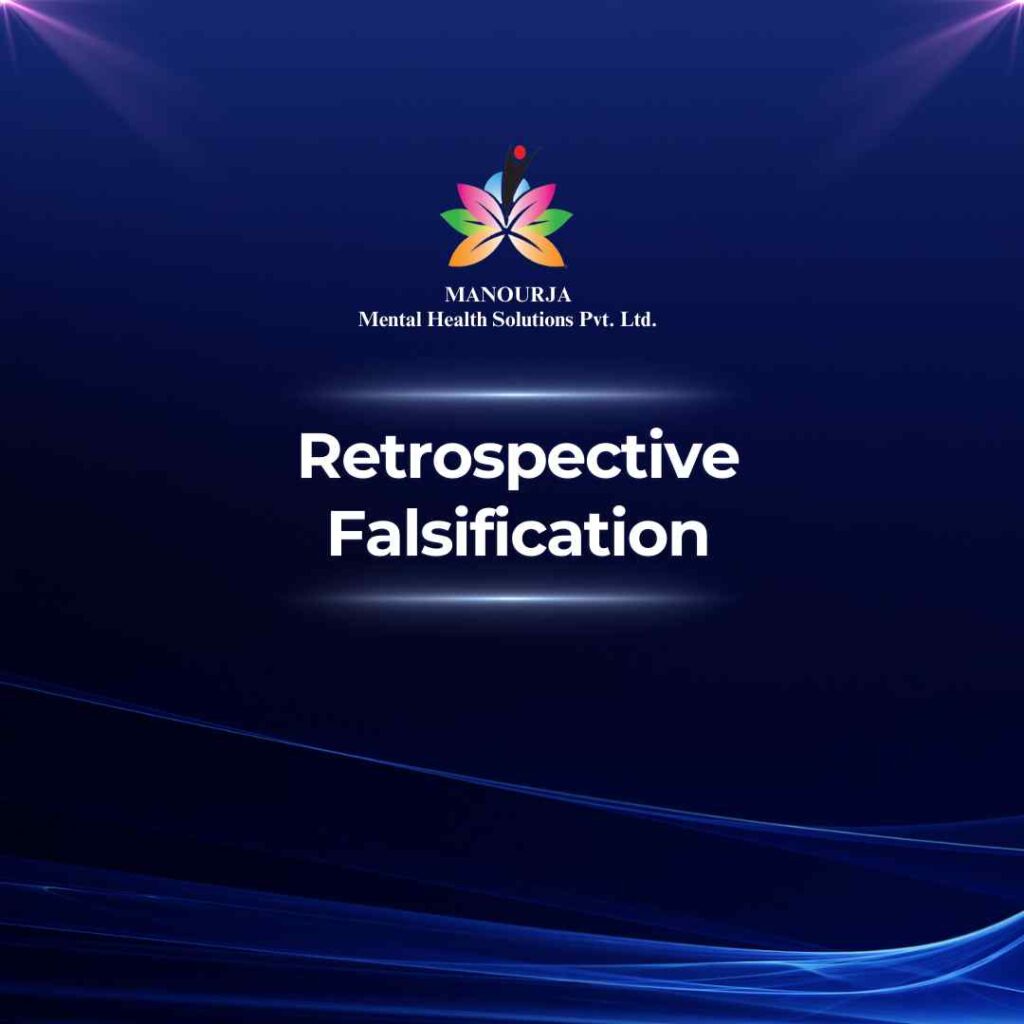Retrospective Falsification

“Retrospective falsification” refers to a cognitive phenomenon where individuals retrospectively alter or distort their memories of past events. This alteration may involve changing details, perspectives, or interpretations of what occurred, often influenced by current beliefs, emotions, or external influences.
Retrospective Falsification as a Sign and Symptom of Mental Illness
Retrospective falsification can be observed in various mental health conditions where there are disturbances in memory, perception, or reality testing. It can manifest as a coping mechanism, a symptom of cognitive dysfunction, or a response to trauma or stress.
Mental Illnesses with Retrospective Falsification as Symptoms
Retrospective falsification can occur in the following mental health disorders:
- Post-Traumatic Stress Disorder (PTSD): Individuals with PTSD may experience retrospective falsification of memories as a way to cope with traumatic experiences. This can involve altering details of traumatic events or denying certain aspects to reduce emotional distress.
- Borderline Personality Disorder (BPD): People with BPD may engage in retrospective falsification as part of unstable self-image and identity disturbances. Memories of past events may be distorted or revised to fit current emotional states or beliefs about oneself.
- Dissociative Disorders: In dissociative disorders, such as dissociative identity disorder (DID) or dissociative amnesia, individuals may experience retrospective falsification of memories due to disruptions in memory processing and integration. Memories may be fragmented, altered, or inaccessible.
- Schizophrenia: Retrospective falsification can occur in schizophrenia, particularly during psychotic episodes where there are disturbances in perception and reality testing. Individuals may reinterpret past events or memories based on current delusions or hallucinations.
- Generalized Anxiety Disorder (GAD): Individuals with GAD may engage in retrospective falsification as a result of excessive worry and rumination about past events. This can involve overestimating past threats or negative outcomes, leading to distorted memories.
- Depressive Disorders: In major depressive disorder and other depressive disorders, individuals may experience retrospective falsification of memories due to cognitive biases associated with negative thinking patterns. This can involve recalling past events in a more negative light than they actually were.
Managing and Treating Retrospective Falsification
Treatment for retrospective falsification focuses on addressing underlying mental health conditions, improving reality testing, and promoting adaptive coping strategies:
- Psychotherapy: Cognitive-behavioral therapy (CBT), trauma-focused therapy, and dialectical behavior therapy (DBT) can help individuals explore and challenge distorted memories, improve emotional regulation, and develop healthier coping mechanisms.
- Medication: Depending on the underlying disorder, medications such as antidepressants, antipsychotics, or anxiolytics may be prescribed to manage symptoms and improve cognitive functioning.
- Reality Testing Techniques: Teaching individuals techniques for evaluating the accuracy and validity of memories, challenging cognitive biases, and distinguishing between subjective experiences and objective reality.
- Supportive Interventions: Providing support from mental health professionals, family members, and peers can help individuals feel validated and encouraged to explore and process memories in a safe and supportive environment.
By addressing the underlying causes of retrospective falsification and promoting accurate memory processing and reality testing, individuals can improve their ability to recall and interpret past events in a way that is more aligned with objective reality, leading to enhanced well-being and improved functioning.
At MANOURJA, we believe in the transformative power of counseling. Our experienced therapists offer a safe and supportive space where you can explore your thoughts, emotions, and challenges. Through personalized counselling sessions, we’ll work together to develop coping strategies, build resilience, and achieve lasting positive change. Discover the path to a healthier, happier you with MANOURJA counselling services.
MANOURJA Rehabilitation Services
At MANOURJA, we’re dedicated to helping you in rebuild your life, after difficult times. Our rehabilitation services focus on understanding what you need to move forward, whether you’re recovering from addiction, trauma, or any psychological – social challenges. We create personalized plans, that are all about helping you, regain your strength and find hope again. With a caring team by your side, you’ll have the support to make real progress and take steps toward a brighter, healthier future.
